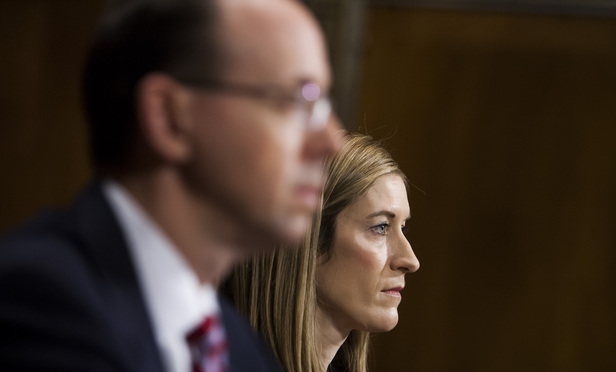Wilmer Hale partner Jamie Gorelick praised Brand, a counsel at the firm, as a rising star in the legal profession. Gorelick is now representing Trump’s son-in-law, Jared Kushner. Brand was at Wilmer from 2008 to 2011. Mueller joined the firm in 2014, so he and Brand did not overlap there.
“She was a star at Wilmer, and she’s done an excellent job in every position she’s held,” Gorelick said Friday.
Brand’s husband, Jonathan Cohn, is a partner at Sidley Austin in Washington, a relationship that means she cannot participate “personally or substantially” in any matter that involves the firm or her husband’s clients, according to her ethics agreement. Cohn is a member of the firm’s commercial litigation and U.S. Supreme Court groups. Peter Keisler is the co-head of Sidley’s Supreme Court team.
Brand shared her confirmation hearing with Rosenstein. The two lawyers appeared together before the Senate Judiciary Committee in March, when Sen. Chuck Grassley inquired about how Brand would transition from challenging the government to protecting its actions. “Just as when I was at a law firm, when I was at the Chamber of Commerce I had a client—the Chamber of Commerce,” Brand replied. “And as a litigator there, my job was to file lawsuits and file amicus briefs on behalf of that client. If I’m confirmed to this position, of course, I’ll have a very different role. I’ll have a different client.”
Brand’s worked SCOTUS “murder boards.” At the Justice Department, she helped select and shepherd federal judges through the confirmation process. In September 2005, Brand, then assistant attorney general as the head of the DOJ’s Office of Legal Policy, oversaw the mock hearings used to prepare John Roberts Jr. for his Senate confirmation hearings. Roberts participated in at least 10 so-called “murder boards,” lasting two to three hours each.

Brand also ran murder boards for Bush’s second high court nominee, then-White House counsel Harriet Miers, who eventually withdrew her name, and her successor nominee—then-Judge Samuel Alito Jr. Brand was a law clerk for Supreme Court Justice Anthony Kennedy from 2002 to 2003. Her fellow Kennedy clerks included Brian Matsui, partner in Morrison & Foerster’s appellate and Supreme Court practice; Igor Timofeyev, partner in Paul Hastings’ litigation practice, and Kirkland & Ellis’ Michael Williams, a litigation and appellate partner. The term was notable for Kennedy’s majority opinion striking down Texas’ criminal sodomy law, and Kennedy’s dissent in Grutter v. Bollinger, which upheld affirmative action at the University of Michigan Law School.
Before joining the Justice Department, Brand served in the White House counsel’s office under Bush. She helped draft the executive order creating the Office of Homeland Security, the precursor to the Department of Homeland Security, according to her profile in a Harvard Law School alumni publication. The title of that profile: “Committed to government service but not to big government.” She attended Harvard Law School from 1995-98.
Brand is deeply familiar with privacy and civil liberties. From 2012 until her confirmation, Brand was a member of the Privacy and Civil Liberties Oversight Board, an independent government agency that advises the executive branch. In a 2015 opinion column for The Hill, Brand stressed the importance of balancing civil liberties with robust, effective intelligence. “Contrary to the perception that foreign intelligence gathering by the United States is like the lawless Wild West, U.S. intelligence agencies are the most heavily regulated, transparent, and closely overseen of any country in the world,” she wrote. Just last year, she testified before the Senate Judiciary committee on the the National Security Agency’s surveillance practices.
She began her career as an FBI intern. She started out as an honors intern at the bureau in 1996, according to her Senate questionnaire. She went on to work as a summer associate at Covington & Burling, Cooper, Carvin & Rosenthal and Simpson Thacher & Bartlett, and as a clerk for Fried when he was associate justice of the Supreme Judicial Court of Massachusetts.
Marcia Coyle, senior Washington correspondent, contributed to this report.



